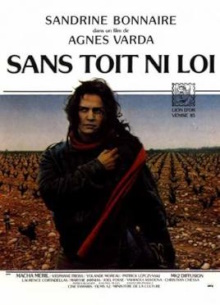Agnès Varda’s films never disappoint and even though this was one of her later works, it’s still amazingly good and brutally unflinching in its portrayal of a wandering vagabond. The title in French is far better and really captures the spirit of the main character. I love how she is defiant and rebellious to the end, even towards the people who are trying to be kind to her. Yet this is far from being any kind of romantic ideal as Varda shows right from the beginning as the corpse of the main character is discovered, having frozen to death in a ditch.
A farm worker finds the corpse of a young woman and calls to police who quickly determine that she froze to death with no evidence of foul play. An unseen interviewer who seems to be Varda herself then retraces the steps of the woman and discovers that her name is Mona Bergeron. The interviewer speaks to the many people Mona met as she hitchhiked her way across the countryside in southern France. Some only have brief interactions with her, such as letting her take water from their pump, others accompany her on her wanderings for a while. One farming couple even take her in and offer her a piece of land to work on. In every instance, she eventually ends up being alone again, either due to some misfortune or more often because she has no interest in actually doing any work over a prolonged period. She never seems to miss any of her past companions and remains defiant in choosing the lifestyle she leads, even when it leads her to being hungry or cold. All she cares about is listening to music, smoking and never being bossed around by anyone.
This is of course a fully scripted, fictional film but its casual interview style and the fourth wall breaking of many of the people in it makes it feel like a documentary of Mona’s life. We never get to go very far back to see how exactly she got started on her journey. From what she tells others, we are able to gather than she was once an ordinary secretary in Paris but simply couldn’t take the regimented life of an office worker. So instead she has chosen freedom and not needing to care about tomorrow, even if that means being homeless and not knowing where her next meal is coming from. Naturally the various people she meets reacts to her lifestyle in different ways. Children who resent being forced to do homework laud how wonderful it sounds to live so freely. One middle-aged academic sympathizes her and when she isn’t quite able to bring herself to take Mona into her own house, is wracked by guilt over it. Perhaps the most nuanced reaction is that of the farmer who also happens to be a philosopher. At first he recognizes in her a kindred spirit who has rejected the capitalist lifestyle. Yet when he realizes that she is a moocher who doesn’t want to work, he condemns her for being the exact type of stereotype that buttresses the arguments of the capitalists.
Alongside being about Mona and the people she encounters, this is a guided tour of the region of France it is set in, just like so many of Varda’s other films. Since Mona never goes to a large city, it’s effectively a tour of the countryside and the people who make their lives there. In addition to the aforementioned philosopher turned farmer, she meets a friendly migrant from North Africa, a maid who happens to see Mona sleeping with another vagrant and keeps thinking about how romantic they are, an agronomist who is trying to stop a fungal infection from killing the trees in the region and so on, each with their own stories and concerns. At one point, she even runs into a local festival in a town, la fête des Pailhasses, where she is chased by some masked festival goers. Varda doesn’t shy away from showing the underside of the rural communities either, so we also see other vagrants, thieves, scammers, drug addicts and so on. Mona takes it all in stride and never goes to the authorities for help even when she is victimized, preferring to hide from the police.
This is very freeform and at times feels like it lacks any unifying theme beyond just showing the grim reality of life as a homeless drifter. I don’t like this as much as Varda’s earlier, more focused films, but it’s still really good. I especially liked how this is a depiction of France in the 1980s, recent enough that we still think of it as the modern era but before computers, the Internet and even the Euro. Highly recommended.
